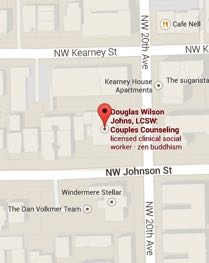

New Clients
Thank you for your interest in my couple therapy practice. Please Note: I now have a new practice and new website at ConciergeCoupleTherapy.com providing expanded services to couples including in-home-based, house call, therapy. Please go to my new website for all inquiries and to connect with me.
Questions regarding insurance use? The quick answer is couples therapy is not covered by insurance. If you have any questions about this contact your insurance provider and ask specifically if diagnostic code V61.10 Relationship Distress with Spouse or Intimate Partner (the appropriate code for couples therapy and marriage counseling) is covered. “V-Codes”, as they are referred to, are not usually covered by insurance. Neither is couples therapy considered medically necessary (one of several criteria for insurance reimbursement) because the problem lies within the relationship between two people not within an individual identified patient who is the focus of treatment. Please contact me with any questions you have about this. For a more detailed explanation please continue reading below.
Medical insurance is concerned with the identification and remediation of disease and illness. All psychiatric/mental health insurance reimbursement requires four things from the clinician: 1. Documentation of an individual identified patient who receives the focus of treatment through an individualized treatment plan, 2. A psychiatric/mental health diagnosis for that identified patient, 3. An assessment and documented finding of medical necessity relevant to the diagnosis for the identified patient, and 4. A CPT code (Current Procedural Terminology) describing the method of intervention. There is no CPT code for couples therapy.
While some therapists believe CPT code “Family Therapy 90847” includes couples therapy, I believe that is in error and puts the clinician who uses 90847 for couples therapy at professional risk when billing insurance. Insurance reimbursement utilizing Family Therapy 90847 still requires an identified patient with a psychiatric diagnosis and an individualized treatment plan linked to medical necessity (and once again V61.10 is the correct diagnostic code for Relationship Distress). Moreover, when the focus of therapy is specifically dysfunctional/problematic relationship dynamics, the insurance industry does not consider treatment to be medically necessary. Many therapists are surprisingly unaware or ill-informed about these criteria, and the implications, when billing insurance for couples therapy. Receiving a records audit by an insurance company may be the first time a clinician fully understands these criteria and the consequences imposed for mismanaging them.
Obviously relationship problems are emotionally painful and sometimes psychologically disturbing for individuals. It is widely understood that healthy relationships across all domains of life improve individual wellbeing. Our society could better serve individual health through acknowledging how problematic relationships of all kind contribute to individual illness (i.e.,depression or anxiety) and through facilitating processes that improve relationships before problems lead to distress and disease. The insurance industry does not promote such levels of care; it is fundamentally reactive to disease rather than proactive towards health. Ironically, proactive attention to relationship distress (and other forms of social distress) would cost society much less in chronic disease and long-term financial outlays than our current dysfunctional system.
Couples therapy and marriage counseling focus on your relationship. There is no “identified patient.” I work to understand both of you as individuals so I can help you relate with yourself and with each other in new ways that improve your relationship. Professionally, both you and your partner are my clients and it is the relationship that may be thought of as the patient. Furthermore, and as alluded to above, medical record documentation for insurance reimbursement should only be concerned with the identified patient; it should not reflect on the behaviors or problems of anyone else. Because medical charts are linked to an individual identified patient, any documentation, or lack thereof, for insurance reimbursement that misrepresents the context of therapeutic services is unethical and may be legally fraudulent.
While I believe couples therapy should be covered by medical insurance, its practice orientation does not fit within the rigid medical disease model of America’s insurance industry. (It’s interesting to note that TriCare and Medicare insurance programs -- federal government programs that often set standards for insurance reimbursement -- specifically prohibit insurance reimbursement for relationship counseling.) Given all the above, I will not risk my license and my livelihood facilitating insurance reimbursement for marital/relationship counseling. However, some Medical Savings Accounts and Flex Fund Accounts can be used for couples counseling. Please inform me if you would like a receipt for your account.
As a couples therapist I am focused on your relationship first and foremost. That intent is not congruent with insurance mandates that require me to assign you a Psychiatric/Mental Health Diagnosis, focus treatment on one individual’s medical problem (depression, anxiety, etc.), create a written determination that treatment is Medically Necessary for the identified patient, and document the patient’s course of treatment whether improved or deteriorated. It’s also important to know that there are potential conflicts of interest and of confidentiality that are unique to couples/marital therapy because there are two adults equally participating and invested in therapy. The medical insurance industry does not account for these unique circumstances.
Understanding these conditions means:
- You and your partner/spouse both have joint control of the therapist’s file; your private issues are not accessible to third parties without both of you giving your written permission.
- You will not have a psychiatric/mental health diagnosis in your medical record.
- The focus of couples therapy will genuinely be on the relationship not on fulfilling insurance mandates.
- Making your relationship the focus of therapy encourages honesty and integrity; you are both responsible to the relationship.
- Medical records are increasingly stored electronically. Your records will not be vulnerable to a database breach or to unauthorized access in ‘the cloud’.


